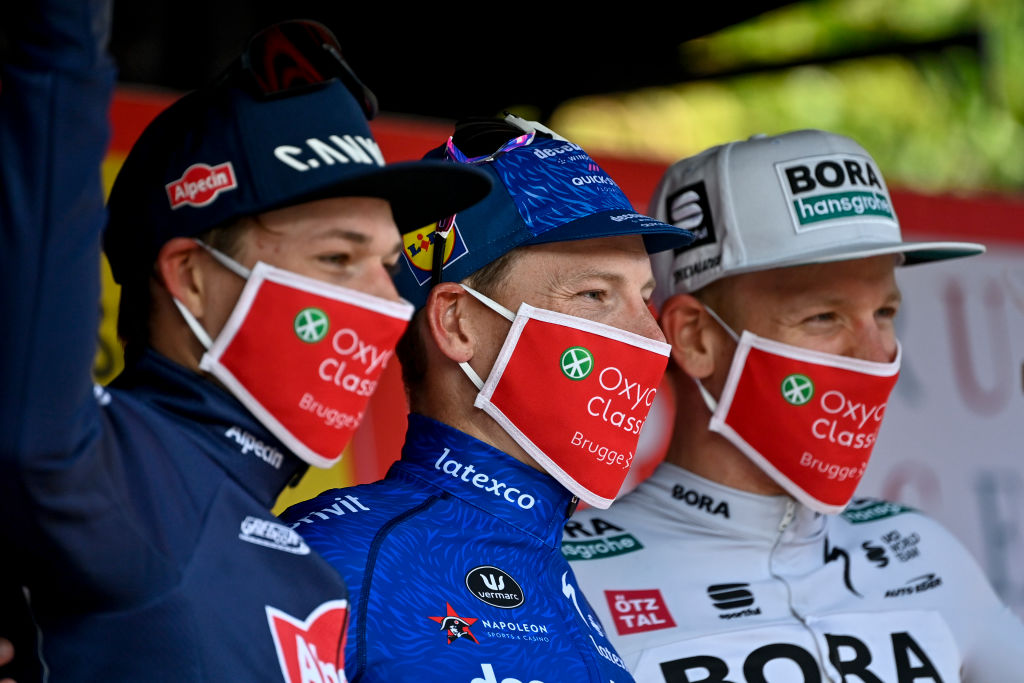Teams tighten COVID-19 bubbles as fear of infection rises before Tour of Flanders
'Anyone who enters the bubble now will not leave it' say Deceuninck-QuickStep

The discovery of COVID-19 cases at Lotto Soudal, Trek-Segafredo and Bora-Hansgrohe before the recent Belgian Classics has put the peloton on high alert in the countdown to the Tour of Flanders, with teams knowing that just one positive case could mean they miss the biggest race of the spring.
Harry Sweeny of Lotto Soudal did not start the Classic Brugge-De Panne last Wednesday because he was ill and later tested positive via a PCR test for COVID-19. Bora-Hansgrohe missed Friday’s E3 Saxo Bank Classic and Gent-Wevelgem after Britain’s Matt Walls tested positive for COVID-19.
They will also miss Wednesday’s Dwars Door Vlaanderen after the COVD-19 doctor for the E3 Saxo Bank Classic ruled that 16 people were classified as ‘close contacts’ and so had to go into a seven-day quarantine. The team hope further testing will allow their riders to join forces with Peter Sagan on Friday so they can field their strongest team for the Tour of Flanders.
Trek-Segafredo withdrew their men’s squad from Sunday’s Gent-Wevelgem after two positive COVID-19 tests but they hope extra testing will give them the all-clear to race on Wednesday. Last week other COVID-19 cases emerged at the Volta a Catalunya.
Teams are obliged to respect the updated UCI COVID-19 medical protocol and create protective bubbles. They undergo frequent pre-race COVID-19 testing and have to follow guidelines on wearing masks and having contact with anyone outside their team bubble. Most teams have chefs preparing their food, with a number of teams eating in special vehicles to avoid contact with other hotel guests and other teams.
Jumbo-Visma have sealed their bubble to protect Wout van Aert, while Alpecin-Fenix have created smaller bubbles within the team bubble, assigning one soigneur to specific riders and limiting contact between the soigneurs.
However, with the more contagious COVID-19 variants now predominant across Europe, teams have tightened their protective bubbles even further to limit the risk of infection and missing major races.
The latest race content, interviews, features, reviews and expert buying guides, direct to your inbox!
“The situation has completely changed even compared to a year ago. If you could say during the first wave that anyone who did not take risks wouldn’t contract the virus, then we are now dealing with a much more contagious variant,” Deceuninck-QuickStep doctor Yvan Vanmol told Het Nieuwsblad.
“We have even tightened up our protocols. The bottom line is that anyone who comes to Belgium for Dwars door Vlaanderen and the Tour of Flanders is no longer allowed to leave the hotel. Anyone who enters the bubble now will not leave it.”
That means Julian Alaphilippe cannot stay in his apartment in Belgium and locally-based riders cannot go home between races.
“It applies to everyone, including the Belgians. No one leaves the bubble,” Vanmol said.
“At the same time, we continue to focus on an enormous amount of testing. We conduct both rapid and PCR tests ourselves. For the latter we use a permanent laboratory. If we hand in our tests before 9am, we will have the result around 2pm This way you can detect positive cases faster and can isolate them."
Vanmol is still on edge about a positive coronavirus case in the team. He is worried about someone outside the team bringing the COVID-19 virus into the team bubble.
“You can keep your riders within a bubble, but the staff of the hotel where you stay will go home every day. Then you can only hope that they do not get infected,” he said.

Stephen is one of the most experienced member of the Cyclingnews team, having reported on professional cycling since 1994. He has been Head of News at Cyclingnews since 2022, before which he held the position of European editor since 2012 and previously worked for Reuters, Shift Active Media, and CyclingWeekly, among other publications.